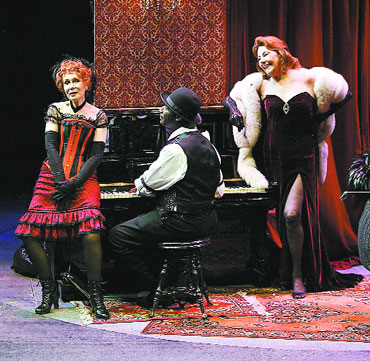Aging ladies of the night; gay camaraderie in the age of drug-resistant HIV
Paula Vogel’s “The Oldest Profession” is, quite simply, a wonderful play, and it’s getting a splendid New York premiere at the Signature Theatre Company, which is devoting its season to Vogel’s work.
At once a wry and heartfelt drama of five aging prostitutes who are scraping by on the streets of New York and a powerful political statement, Vogel deftly balances the many layers of the piece with a kind of mastery that is always subtle but extraordinarily powerful.
Vera, Ursula, Lilian, Mae and Edna have been “in the life” for the past 50 years. They have seen each other through life in New Orleans to New York, where age and competition have rendered them nearly irrelevant in a profession that prizes youth. Still, they have a loyal, if elderly, clientele that has managed to keep them safe from disaster. Their “office,” a bench outside the 72nd Street subway station is where they struggle with the problems they face as times change and they struggle to adapt and survive in an increasingly hostile environment. It is alternately touching and maddening to watch as these women muddle through—and as each meets an inevitable fate.
As political metaphor, Vogel has chosen women whose profession makes them social outcasts—invisible to the establishment and powerless to rely on the system to improve their lot. Forgotten and unconsidered, they have to survive on their wits in a society that gradually withdraws each of the supports that had been there—they get evicted from their subsidized hotel above Zabar’s as it makes way for condos.
The parallels, though never heavy-handed, to the scuttling of social programs and tax cuts for the wealthy that are the hallmarks of the Republican Party, are unavoidable. When all but the most privileged are abandoned, we will all be in the position of these women. That’s an abstract message, but under David Esbjornson’s fluid and sympathetic direction, the vibrancy of these women even in the face of disaster is oddly uplifting.
Vogel writes in a sharp and bare-knuckled cadence that reflects her characters. Even when well-dressed, they are not afraid of vulgarity, and that vulgarity puts them even more out of the mainstream, yet strengthens the bond among them.
The five women in the cast are consistently exciting to watch. The elegant Carlin Glynn plays Lillian as a woman who’s seen it all and accepts what life brings her. Katherine Hellmond is the more driven Mae, the madam who has kept the five together over the years. She is forceful and determined, at sea when her faculties begin to desert her.
Joyce Van Patten is Ursula, a deluded Reaganite who symbolizes the legions of people who bought the promises of trickle-down wealth and universal affluence only to be destroyed by the truth. Van Patten is a wonderful actress, who has a star turn late in the play that is not to be missed. Priscilla Lopez is top-notch as Edna, the woman who is asked to take on powers for which she is unprepared.
But it is Marylouise Burke as Vera, however, who very nearly walks off with the show. The peacemaker, the conciliator, she seems the most unlikely prostitute, but Burke has a youthful vigor and an optimism, that is rendered almost scary with her heavily rouged cheeks
The intelligence and entertainment of this piece and its successful use of abstraction bordering on absurdity makes “The Oldest Profession” a fascinating and rewarding evening, and makes one look forward to the rest of the season at the Signature Theatre.
I had not heard of the phenomenon of “Poz parties” prior to seeing “Masquerade,” the earnest new AIDS play now in a limited run at the Cherry Lane. While the premise is strong—a “Poz party” for a man newly diagnosed with HIV goes wrong and prompts discussions on what it means to be gay—the piece seldom works and seems like a lukewarm “The Boys in the Band” or the more recent “Last Sunday in June,” both of which also used a party to assemble a diverse group of gay men.
Playwright Brian C. Petti is heavy on exposition and long speeches but the characters for the most part talk at one another. They are neither well-developed nor original characters. The dialogue is more polemical than personal and the arguments are not well developed enough—as they are, say, in Shaw or in the recent production of “The Frogs”—to be interesting for argument’s sake.
What worked in the earlier “party plays” was that the characters were individuals and that as a group they knew each other and were intimate in both deep and destructive ways. Petti has not given any of his characters more than a few clumsy sentences to set them up—the long-term couple, the solitary older man, the party animal and so forth. Superficially, it is interesting to look at how gay men who lived through the discovery of AIDS and men who have always known it react differently to the disease, but because we never get to the heart of these men (and two women) the play stays distant.
The talented cast is what keeps this play going. Dan Domingues as the rakish Rodolfo brings energy and presence to the company. Christopher Betz playing Margaret—a tribute to children’s book author Judy Blume—don’t-ask—is consistent and heartfelt. Ryan Murray as Doug, the newly positive character, is quite good with a simple honesty and open presence that is stronger than the part written for him. But the play belongs to Brian Linden, who as Peter the downstairs neighbor with late-stage AIDS, brings a dose of reality and powerful acting into the party when he shows up uninvited.
This is a strong effort, and the play has potential. It’s an important idea and deserves a rewrite. Hopefully Petti is up to it.



































